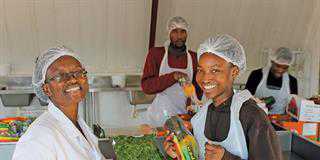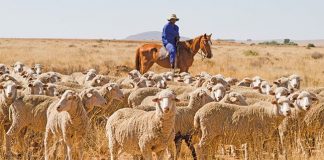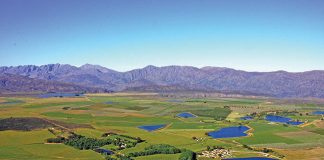How does the former president of the Azanian People’s Organisation pair up with a meticulously run agribusiness, one that has always considered economics, not politics, as its guiding principle? Well, suffice to say, it wasn’t easy. It took Khehla Mthembu, Kgomo Kgolo Agricultural Investments Consortium head, a year of relentless courting before he got so much as an audience. “At one stage they [Kanhym] even closed the door on me,” he remembers.
So one Sunday morning Mthembu simply decided to phone Kanhym’s CEO Dr Theunis Prinsloo and inform him that he was driving from Johannesburg to the farm in Middelburg, Mpumalanga, so that Prinsloo could look him in the eye and tell him why he wasn’t prepared to deal with him. Prinsloo agreed, and over an English breakfast the two finally found common ground.
It helped that Mthembu didn’t assault Prinsloo with wild ideas. Instead he made sensible suggestions, such as introducing a broiler chicken operation, a bigger focus on animal genetics and agritourism, a topic Mthembu knew something about after serving a stint as Sun International’s chairperson. “We want people who share our values in this company,” Prinsloo said afterwards, with those values being eventual broad- based ownership, not taking unnecessary risks and ensuring the growth of Kanhym as a business that can deliver good dividends for its stakeholders. “Agriculture has its own cycles, and while tomorrow can’t be predicted, it is important to be able to keep on farming.”
What Prinsloo was looking for in a partner was someone who shared Kanhym’s emphasis on diversification and high ethical values. The decision to introduce a BEE component, despite there not being an industry scorecard yet, was simply because it opened up business opportunities. “Without a good scorecard, the company could lose numerous deals in the future,” Prinsloo says. “We’re not only focused on the current business, but also future ventures”. For Mthembu the future possibly lies beyond South Africa’s borders. “I see our goal as going beyond South Africa and rather see Kanhym as a farm in SADC (Southern African Development Community) and ensuring that we have strong neighbours,” he says. It wasn’t only Kanhym’s R500-million annual turnover that impressed Mthembu. “It [Kanhym] has very strong management on first, second and even third level,” he says. And so it happenend that nearly two years later one of the most significant BEE deals in agriculture to date was signed between Kanhym Estates and Kgomo Kgolo.
Structuring the BEE deal
Prinsloo says the deal is unique in agriculture as it involves both currently employed black workers and corporate business people. With negotiations still in progress, the details behind how the deal will be financed are still unclear, with negotiations currently taking place between Kgomo Kgolo and the Mpumalanga government to fund the workers’ shares through the department’s Land Redistribution for Agricultural Development Scheme. Shares that have not yet been issued were used for this transaction, with the 28% BEE component being made up of Kgomo Kgolo’s 18% share, the workers trust’s 8%, and salaried personnel’s 2%. About 476 farmworkers will benefit from the transaction.
Kanhym Estates – the business
Established in 1936, Kanhym started out as a business of the Kahn and Hyman families. Over the years it made its transition to the corporate world through Gencor, Malbak and Foodcorp. In S eptember 2001, all Kanhym staff became the proud owners of the company. With its 9 459ha headquarters close to M iddelburg, Mpumalanga, Kanhym Estates is further spread out over five outlying properties near Heidelberg, Babsfontein, M agaliesburg, Marble Hall and Vereeniging. In total Kanhym owns 10 277ha of prime agricultural land. Kanhym believes in reducing financial risk through diversification, while retaining the benefit of economies of scale. Bearing out this philosophy, Kanhym has four main production divisions – feed production, a piggery, field crops and beef production – all supported by specialised service departments.
Field crops: A total of about 6 620ha of Kanhym land is cultivated. Maize is the leading crop, with a cultivation area of 4 420ha and a yield of 6,4t/ha in the last financial year. Soya is cultivated on 2 220ha and yields an average of 2t/ha. Precision farming techniques are implemented throughout, resulting in clear improvement in production output. All grain produced is sold to the milling division at the current market price. This unit contributes 19,6% to the company’s profits.
Animals feeds: Contributing about 35,6% to the company’s profits, the animal feed division is supplied by the crop division. The company produces 240 000t of animal feed annually – 40% of the total production in Mpumalanga. It mainly produces poultry, pig and beef cattle feeds, and distributes in bulk to larger clients or in bagged form through its network of agents. About 30% is used internally in the company’s feedlot and piggery.
Feedlot: Contributing 8,7% to profits, a total of 23 400 animals were marketed in the last financial year. Meat retailing is done through Kanhym Fresh Meat where the main drive is to commercialise the trade names “Tenderlicious” for beef and “Slenderlicious” for pork.
Piggery: Contributing about 35,9% to profits, the piggery is Kanhym’s most important activity. Breeding and marketing of genetic material for the South African pig industry makes up the biggest part of this division. Kanhym holds a genetic license for Pig Improvement Company (PIC) of the UK for the African continent, and has a competitive edge due to the technical support and the updating of genetics from PIC, the world leader in pig genetics. Locally, Kanhym holds about a 35% to 40% share in the live pig breeding market, as well as about 60% of the boar market for artificial insemination.
The new Kanhym board of directors
Khehla Mthembu (non-executive chairperson)
Theunis Prinsloo (managing director)
Arthur Gee (executive director)
Willie Oosthuizen (executive director)
Willem van Zyl (executive director)
Thys Pelser (non-executive director)
Henning van Aswegen (non-executive director)
Goitsemang Moseki (alternate director)
Shareholding after the new BEE transaction
Kgomo Kgolo, a one-year-old consortium, is mainly owned by Mthembu and Thys Pelser – a part-time farmer and personnel placement specialist. It already owns a 1 000ha cattle farm in Mogopong, Limpopo. Mthembu and Pelser were introduced to the Kanhym team by Dave Ford, head of the SA Feedlot Association. The original Kanhym shareholders – Theunis Prinsloo, Willie Oosthuizen, Willem van Zyl and Arthur Gee – still own 56% of the company, with the remaining shares being split between Kanhym employees (13%) and about 6% reserved for other investors. While share value is still undefined, Prinsloo says shareholders will receive annual dividends. Farmworkers have the option of selling their shares back if they leave. With the deal allowing Kgomo Kgolo to eventually buy a 51% controlling share of the company, Prinsloo says it would not even have been on the table for discussions had Kanhym not felt secure in the transaction. “Irrelevant of who owns the company, the main aim is to see it grow,” Prinsloo says. In the beginning of April Mthembu was elected new non-executive chairperson of Kanhym Estates, with Kgomo Kgolo’s Thys Pelser and Goitsemang Moseki elected as new directors.












